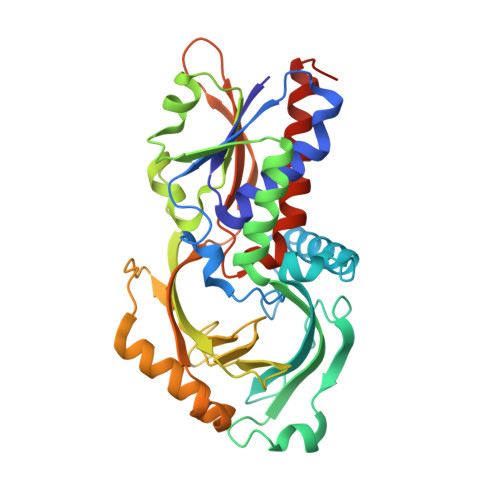4-Hydroxypyridazin-3(2H)-one Derivatives as Novel d-Amino Acid Oxidase Inhibitors.
Hondo, T., Warizaya, M., Niimi, T., Namatame, I., Yamaguchi, T., Nakanishi, K., Hamajima, T., Harada, K., Sakashita, H., Matsumoto, Y., Orita, M., Takeuchi, M.(2013) J Med Chem 56: 3582-3592
- PubMed: 23566269
- DOI: https://doi.org/10.1021/jm400095b
- Primary Citation of Related Structures:
3W4I, 3W4J, 3W4K - PubMed Abstract:
D-Amino acid oxidase (DAAO) catalyzes the oxidation of d-amino acids including d-serine, a coagonist of the N-methyl-d-aspartate receptor. We identified a series of 4-hydroxypyridazin-3(2H)-one derivatives as novel DAAO inhibitors with high potency and substantial cell permeability using fragment-based drug design. Comparisons of complex structures deposited in the Protein Data Bank as well as those determined with in-house fragment hits revealed that a hydrophobic subpocket was formed perpendicular to the flavin ring by flipping Tyr224 in a ligand-dependent manner. We investigated the ability of the initial fragment hit, 3-hydroxy-pyridine-2(1H)-one, to fill this subpocket with the aid of complex structure information. 3-Hydroxy-5-(2-phenylethyl)pyridine-2(1H)-one exhibited the predicted binding mode and demonstrated high inhibitory activity for human DAAO in enzyme- and cell-based assays. We further designed and synthesized 4-hydroxypyridazin-3(2H)-one derivatives, which are equivalent to the 3-hydroxy-pyridine-2(1H)-one series but lack cell toxicity. 6-[2-(3,5-Difluorophenyl)ethyl]-4-hydroxypyridazin-3(2H)-one was found to be effective against MK-801-induced cognitive deficit in the Y-maze.
Organizational Affiliation:
Drug Discovery Research, Astellas Pharma Inc., 21 Miyukigaoka, Tsukuba, Ibaraki 305-8585, Japan. takeshi.hondo@astellas.com






















